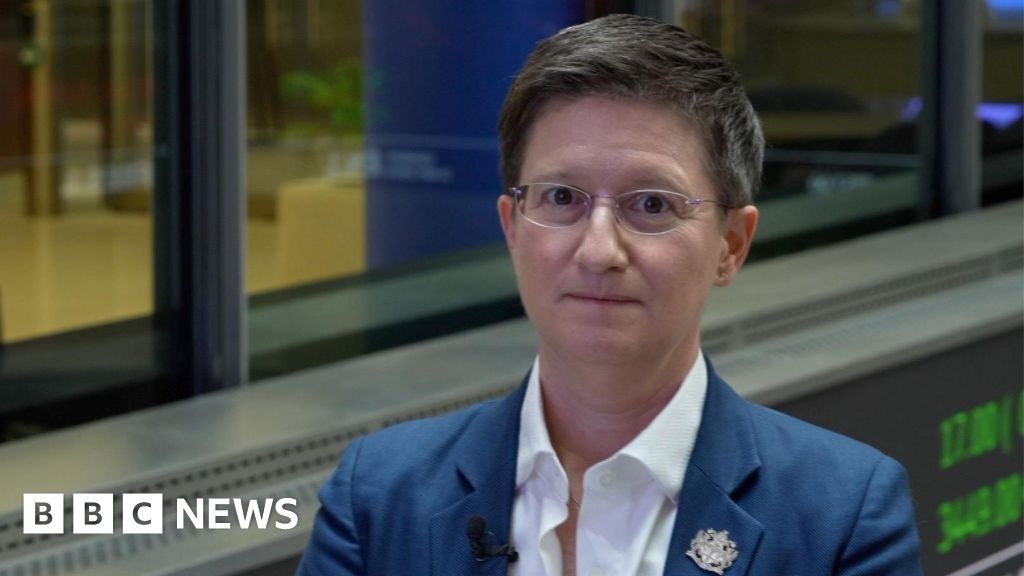The chief executive of the London Stock Exchange has denied it is in crisis despite firms worth hundreds of billions of pounds quitting for the US.
Company bosses have told the BBC that the UK faces an “existential crisis” as big firms have either already left, are considering a move or have been bought by private foreign investors.
But Julia Hoggett said “there’s no sense of panic” as the UK “is already punching above its weight”.
A Treasury spokesperson said the UK was “already one of the best places in the world to grow and secure investment” and it was working on ways “to improve the UK’s competitiveness further”.
The Chancellor Jeremy Hunt will hold a summit of finance chiefs on Thursday to brainstorm how to boost the appeal of UK markets to domestic and international companies.
Having big companies’ shares listed in the UK matters because other industries – like insurance, accounting, law, pensions – cluster around them.
Financial services accounts for 10% of the whole UK economy and generates £90bn a year in tax – half the NHS budget.
But a growing number of companies are delisting from the London Stock Exchange.
Cambridge-based microchip giant ARM Holdings – once listed in London now sells its shares in New York. Paddy Power’s owner Flutter will move there this summer. UK drug company Indivior’s shares soared when it said it was considering moving while even the UK stock market’s biggest company Shell has warned it may move.
Smaller companies have also told the BBC that being listed on UK markets is just not worth it.
Biotech company E-therapeutics was listed in London for 17 years – until last week. Boss Ali Mortazavi is also looking at the US said the London market is now broken and closed.
“Has it reached a crisis point? Unequivocally yes”, he said.
“In fact, I think that’s a bit of an understatement. I would call it existential risk.”
The UK’s biggest company Shell has repeatedly warned that it would look at “all options” to narrow the 30% discount that Shell is valued at compared to its US rivals. Shell’s chief executive Wael Sawan told the BBC last year that US markets had rolled out the red carpet.
“I extend my real appreciation to the folks at the New York Stock Exchange. The welcome we had there was exemplary.”
Asked about a potential move to New York, he said: “It would be irresponsible to rule anything out.”
Charles Hall of investment bank Peel Hunt said Shell’s departure would be a hammer blow for London.
“That would be absolutely massive, because inevitably, other companies would follow,” he said.
“BP would then have to be considering it, all of the big mining companies too…The UK market shrinks and then global asset managers put less money into the UK, so it definitely impacts our own economy, not just the stock market,” he said.
Mr Hall added that while the city of London had lost some of its business to EU financial centres after Brexit, other European exchanges were also struggling to compete with New York.
Tech giant Apple is worth more than all of the 100 biggest companies listed in London put together. So is Google and Microsoft. On average companies on US markets are valued at twice the price per pound or dollar of profit as the UK. But Ms Hoggett said those few big US companies were distorting the picture.
“When you strip them out and look at the actual companies of similar sizes in the US to the sort of company size that we have in the UK. They haven’t really been out-performing,” she said.
Responding to claims that the London stock market is in crisis, closed or broken. she said: “In terms of the pipeline of companies we’re seeing preparing to come to the market, but also in terms of the activity of the companies that are on the market, that is demonstrably not true.”
She added: “We’ve got all the fundamentals here in London, and I see a strong cause for optimism.”
Ms Hoggett said finding a way to funnel more UK money into UK companies was key. UK investment managers only put 4% of their assets into UK shares. That is down from over 40% some 30 years ago and well below the average of other countries.
“The vast majority of all other developed nations who have strong capital markets and strong economies direct far more of their domestic pension money into their own economy than the UK does. And therefore, that is one of the biggest areas of reform that we do still need to see.”
It’s not all one-way traffic. Tech start up Raspberry Pi is listing soon in London, and Chinese fast fashion giant Shein is considering London having hit snags with regulators in New York.
A Treasury spokesperson said: “The UK is already one of the best places in the world to grow and secure investment and we are taking forward an ambitious programme of capital market reforms to improve the UK’s competitiveness further.”
The chancellor and the LSE chief insist London isn’t burning but Mr Hunt clearly thinks its important enough to fetch the engines to a special summit at his country residence on Thursday.

Robert Johnson is a UK-based business writer specializing in finance and entrepreneurship. With an eye for market trends and a keen interest in the corporate world, he offers readers valuable insights into business developments.








